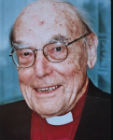The death of Kenneth Cragg, just months short of his hundredth birthday, marks the earthly passing of one of the great ones of the Middle Eastern Church, and one of the most humble.
With Kenneth, many will still remember Melita. Their meeting he called an event “decisive to all else”. They were married in All Saints Church, Beirut in 1940. Ever since, in life and death, Melita was at the heart of a much-loved family, with John, Arnold and Christopher.
Kenneth and Melita went separately to Lebanon with the British Syria Mission and the Diocese of Jerusalem. Living, studying Arabic and working in Shemlam, Kenneth also acted as Chaplain of All Saints Church, Beirut. It was in Shemlan that Kenneth found himself “entranced with the beauty of the land and avid for intimacy with its people.”
In Beirut, Kenneth established St Justin’s House, a small hostel for Arab and Jewish students at the American University. The Bishop “hoped that if Jews and Arabs were schooled together in youth they would resolve their politics in maturity.”
The 1948 War brought the closure of St Justin’s so, instead of returning from study in Oxford, Kenneth accepted an invitation to Hartford Seminary, Connecticut to teach in the Islamic Department and edit “The Muslim World Quarterly ”. His ‘The Call of the Minaret’ was published and he began to advocate principles of dialogue which are now fundamental to much inter-faith encounter.
Back in the Middle East, Kenneth was Study Secretary of the Near East Council of Churches and Residentiary Canon of St George’s Cathedral, Jerusalem. Travel was constant. Later, Kenneth noted that in forty years he had taken 342 flights. From this period came the series of study booklets entitled Operation Reach, Emmaus Furlongs and a little later Grace Cup. Jerusalem, though, was always the venue of Kenneth’s Summer Schools from 1958 – 1967, though from 1959 he came from Canterbury and the Central College of the Anglican Communion of which he was the last Warden. He found the decision to close it a sorry failure of vision and resolve and hard to forgive.
When George Appleton became Archbishop in Jerusalem he invited Kenneth to be Assistant Bishop in the Archbishopric, based in Cairo. This post ceased in 1976 when the Province of Jerusalem and the Middle East was formed. It was, Kenneth noted, his third redundancy.
 When Bishop Hassan Dehqani-Tafti became Bishop President, he invited Kenneth to be his Honorary Assistant, travelling from England. They had met in Isfahan when Kenneth was Study Secretary and began a mutually enriching friendship. Craftsmen in words, lovers and composers of poetry, they were both fellow-sufferers in the service of Christ and his Church.
When Bishop Hassan Dehqani-Tafti became Bishop President, he invited Kenneth to be his Honorary Assistant, travelling from England. They had met in Isfahan when Kenneth was Study Secretary and began a mutually enriching friendship. Craftsmen in words, lovers and composers of poetry, they were both fellow-sufferers in the service of Christ and his Church.
With Melita’s health failing, she and Kenneth moved in retirement to Ascott-under-Wychwood in Oxfordshire, in the churchyard of which they were buried. Those who saw Kenneth’s care of Melita in her illness could not help being touched by their devotion. After her death, Kenneth settled in Oxford for some years then, latterly, at the College of St Barnabas, Lingfield.
Such are some structures of a very long and full life. What are some of the elements that enriched it? Perhaps The Call of the Minaret is still the most widely remembered of some twenty books. None are easy reading. Every sentence is rich in meaning, expressed in a unique prose. In spoken mode, Kenneth was clear and direct, never simplistic but insightful, challenging and captivating. One remembers him, in his nineties, addressing the Cyprus and the Gulf Synod for nearly an hour without note or pause. Not long before he had sat among eight hundred students in al Azhar, dialoguing directly and sensitively. His friends looked forward to his poems at Christmas with their unexpected insights into the Incarnation.
Kenneth grew to love the native Anglican Churches, Arab and Persian. His affection for the Diocese of Iran was deep and mutual as reflected in the significant representation of ‘Iran in diaspora’ at his funeral.
Kenneth was a warmly human person, humble and unselfconscious. He wore his learning, like his deep faith, lightly. At the core of his being was a faith deepened and enlarged by lifelong meditation and encounter. Incarnation, Cross and Resurrection were the base of conviction from which he could penetrate deeply into another faith. He stands with his heroes, Temple Gairdner and Constance Padwick. We thank God for him.
